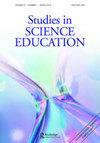在科学教育中支持中学生的道德发展
IF 9.9
2区 教育学
Q1 EDUCATION & EDUCATIONAL RESEARCH
引用次数: 10
摘要
摘要:本综述综合了28篇实证研究文章,强调在中学科学教育中解决社会科学问题(SSI)背景下的道德方面的学习。在这项研究中,我们试图解决的关键相关问题是,在新兴的可持续性问题的背景下,道德如何在科学课堂上概念化,以及如何发展。我们使用道德的四要素模型来创建一个知识库,以了解中学科学教育文献中道德是如何概念化的,以及如何发展道德。这项回顾研究的结果表明,并非所有的研究都使用了具体、明确的道德概念,而且地点感和道德的情境性的作用经常被忽视。研究还发现,关注学生道德品质和行动的研究被低估了。我们建议对道德品质和既定道德推理之间的相互关系进行进一步的研究。这篇评论还揭示了道德研究与教学之间的差距。基于这一综述的结果,我们提出了一套建议,旨在引导和鼓励学生在中学科学教育中的道德。本文章由计算机程序翻译,如有差异,请以英文原文为准。
Supporting Secondary Students’ Morality Development in Science Education
ABSTRACT This review study synthesises 28 empirical research articles emphasising the learning of morality aspects in the context of addressing socioscientific issues (SSI) in secondary science education. The key interrelated questions we seek to address in this study are how morality is conceptualised in the science classroom in the light of emerging sustainability issues and how it can be developed. We used the Four Component Model of Morality to create a knowledge base for how morality has been conceptualised in the literature on secondary science education and how it can be developed. The findings of this review study show that not all studies have used concrete, explicit conceptualisations of morality and that the role of sense of place and the situatedness of morality have often been neglected. It also emerged that studies focusing on students’ moral character and action-taking were underrepresented. We recommend that further research be carried out on the interrelationships between moral character and enacted moral reasoning. The review also reveals a gap between morality research and teaching. Based on the outcomes of this review, we propose a set of recommendations aimed at guiding and encouraging students’ morality within secondary science education.
求助全文
通过发布文献求助,成功后即可免费获取论文全文。
去求助
来源期刊

Studies in Science Education
EDUCATION, SCIENTIFIC DISCIPLINES-
CiteScore
15.30
自引率
2.00%
发文量
7
审稿时长
>12 weeks
期刊介绍:
The central aim of Studies in Science Education is to publish review articles of the highest quality which provide analytical syntheses of research into key topics and issues in science education. In addressing this aim, the Editor and Editorial Advisory Board, are guided by a commitment to:
maintaining and developing the highest standards of scholarship associated with the journal;
publishing articles from as wide a range of authors as possible, in relation both to professional background and country of origin;
publishing articles which serve both to consolidate and reflect upon existing fields of study and to promote new areas for research activity.
Studies in Science Education will be of interest to all those involved in science education including: science education researchers, doctoral and masters students; science teachers at elementary, high school and university levels; science education policy makers; science education curriculum developers and text book writers.
Articles featured in Studies in Science Education have been made available either following invitation from the Editor or through potential contributors offering pieces. Given the substantial nature of the review articles, the Editor is willing to give informal feedback on the suitability of proposals though all contributions, whether invited or not, are subject to full peer review. A limited number of books of special interest and concern to those involved in science education are normally reviewed in each volume.
 求助内容:
求助内容: 应助结果提醒方式:
应助结果提醒方式:


